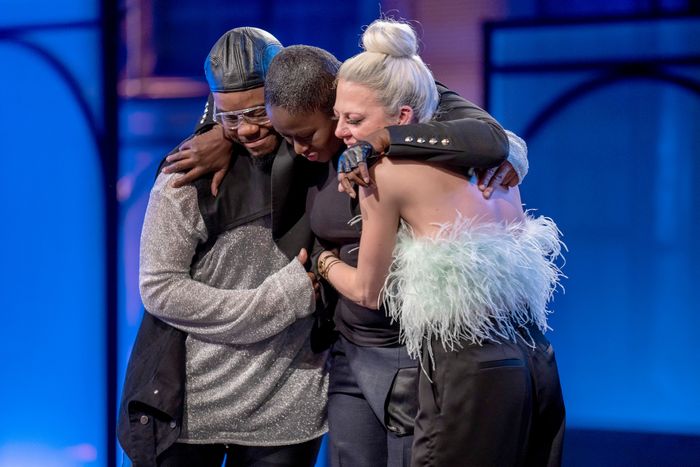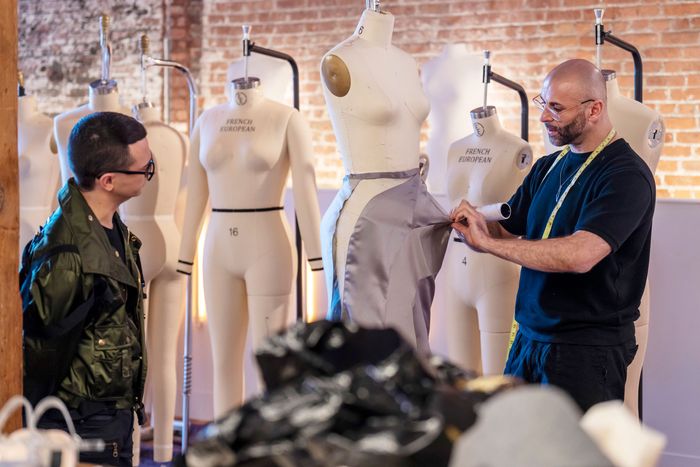
In the early aughts, before Bravo became synonymous with Real Housewives, Scandoval, and the Andy Cohen empire, the cable network built on Queer Eye for the Straight Guy’s unexpected cultural omnipresence with Top Chef and Project Runway, a pair of competition shows ostensibly centered on, respectively, cutting-edge cuisine and high fashion. Nearly 20 years later, they’re Bravo’s only remaining competition series, and both have become legacy institutions in the reality-TV space. When Top Chef convened international contestants for its 20th season and Padma Lakshmi announced her exit from the series, we wondered whether World All-Stars was the end of Top Chef as we know it; and now Project Runway’s 20th season, with its similar all-stars format and often-inexplicable judging, has us wondering if Bravo’s other stalwart tournament needs a refresh, too. Ahead of the season finale, Vulture critic Roxana Hadadi and writer Jason P. Frank dug into that question, this season’s attack on “dated” fashions but defense of “referential” designs, and whether this final trio deserved their runway shows.
Roxana Hadadi: Jason, I write this to you through tears over Rami Kashoú’s unjust exit in the semifinals of this 20th season of Project Runway. These judging decisions, they make no sense — and we’ll get into that. But before then, let’s talk about how this All-Stars season fits into the series’ legacy.
I remember watching Project Runway in my college dorm room when it debuted, and then with my best friend in our first postgraduation apartment. Back then, before reality TV was fully everywhere, it was a phenomenon with Tim Gunn’s “Make it work!” catchphrase and Heidi Klum taking time off from supermodeling to host and judge. From the very beginning, the show was great at casting passionate, distinct competitors who had a specific fashion perspective and work ethic, the apex of which was season four winner Christian Siriano, whose success afterward made him nearly as synonymous with the show as Tim and Heidi. Yet I think it’s fair to say that Project Runway’s impact waned as the reality-TV genre expanded and Gunn and Klum left for their Prime Video series Making the Cut. The series has tried making changes to stay fresh — the judging panel, which once held Michael Kors, swapped in other designers like Zac Posen and Brandon Maxwell, added magazine editor Elaine Welteroth, and in its smartest move, brought back Siriano as a mentor and host starting in season 17 — but I admit that my interest lessened as it felt like Project Runway wasn’t finding the same caliber of people and wasn’t creating new challenges.
This season, however, has mostly clicked for me, despite some quibbles that we’ll talk through. Bringing back previous contestants who are familiar with Project Runway’s time and budget constraints (and have their own grudges and dramas) has been engaging; Siriano is a thoughtful and spirited onscreen presence, even if he rarely says “fierce” anymore; the ’90s high school-themed team competition was very fun. We can get into whether we think the judging has matched this vibe or dragged it down, but in general, Jason, how have you felt about this season?
Jason P. Frank: The first season I watched live was season eight (the Mondo Gretchen season), which, not to de-age myself, came out when I was in fourth grade. Since then, I’ve gone back and watched every season from the original Bravo years multiple times, read the associated Project Rungay recaps that are now lost to link rot (my personal burning of the Library of Alexandria), and mourned the loss of that scrappy show that could. I kept up with the Lifetime seasons, which were much less naturally dramatic and inventive, out of a sense of obligation, but when the show returned to Bravo with season 17, I became newly reinterested in it as a concept. The new version has more life than it did on Lifetime — better, harder challenges help — but it still suffers without Heidi as a grounding force. Karlie Kloss wasn’t as charismatic, and with her now gone and no host present at all, Project Runway feels entirely unmoored. The contestants are good, but the show never regained the sense of unbridled creative ambition that it had in the early years. With exactly one prominent designer to its name in Siriano, Project Runway is increasingly an exercise in hoping for moderate success, for both the contestants and production.
This All-Stars season has exemplified that. God love her, but Brittany Allen making the final three is an indictment of the idea that this is a show about creativity. She has consistently produced clothing that shows her to be a good study, but not a creative force. Each time she comes to a challenge that doesn’t suit her (avant-garde, menswear, etc.), she pulls out a derivative design, and often that design gets praised. With Kara Saun’s casting this season, I was forced to remember how a major factor in her not winning season one was that her collection was reminiscent of Gucci. Times have changed, and not for the better. Roxana, I know you have major problems with the judging this season as well. Is it all to do with Brittany’s ascension, or do you have other complaints?
RH: Karlie Kloss! That’s a blast from the past, thank you for that momentary glimpse into my own mortality.
You mentioning Kara Saun’s season-one loss is making me think about how in the ensuing years, the series hasn’t explicitly addressed the ways in which the fashion industry has been altered. There’s the rise of fast fashion, the diminishment of New York Fashion Week, the narrowing of which fashion lines can succeed at certain scales; when Posen announced his fashion line was shutting down, the New York Times wrote that “even Project Runway couldn’t save” the designer’s business. On the one hand, there has always been a comfortable sameness to the Project Runway format: Here’s a challenge (and sometimes, here’s your client), here’s your budget and your allotted work time, give us an outfit. On the other hand, compared with Top Chef — which I think we can safely argue has changed dining in this country with its proliferation of restaurants owned by contestants and winners — has Project Runway changed fashion at large? Siriano is the most recognizable and famous name to come out of the show, but Project Runway itself has shown an odd refusal to adapt to what people want now. So because the structure of the show hasn’t changed, the ways in which the judging has become that much more evident. And given that, yes, this season has been so messy.
According to the judges this season, it’s okay when some contestants are “referential” in their designs, like Brittany’s nearly direct Gucci knockoff in the “Let Me See Your Peacock” menswear challenge or Bishme Cromartie’s Iris van Herpen/Mugler hybrid in “The Sky’s The Limit.” At the same time, it’s not okay when something is “dated,” a generic catchall term that Elaine seemed to use most when criticizing earlier-season contestants like Rami and Kayne Gillaspie, although she rarely would explain what about an outfit inspired that adjective. But just like Top Chef did with Buddha Lo, sometimes the things that judges criticize for one contestant — fabrication issues, not meeting the challenge description — are totally fine for another contestant. (Am I still heated about Buddha’s back-to-back wins? Yes!) It’s frustrating to watch Project Runway mess around with these inconsistencies 20 seasons in because we can see the design and construction of these fashions for ourselves, do some quick research to see how much the final looks might be a copy of another designer (sometimes, even designers on the same season of the show), and consider the contestants’ work within the full context of their creative output. If we can so easily pick up on whether one competitor’s work is overly similar to another’s, shouldn’t the judges, too? (As you note about Kara Saun, they definitely used to.) This isn’t like Top Chef, where we can’t taste the dishes for ourselves and have to trust the judges’ palates. The Project Runway process does inform us, but now our knowledge makes the judges’ contradictory opinions feel less like objectivity and more like playing favorites.
I certainly have a lot of couture opinions for someone who spends most of her day in graphic T-shirts and sweatpants, but it’s not my fault I have integrity! Have you been peeved by that sense of incoherence, Jason?
JPF: I definitely have. You bring up a great point with Elaine: She rarely expounds upon her adjectives. What makes critique worthwhile, especially in a reality competition format, is getting to see professionals fully explain themselves. Her critiques often rest on a kind of shorthand that isn’t clear (“I could see this at the club” is an oft-repeated refrain that amounts to very little), and Brandon and Nina aren’t picking up the slack.
What was particularly interesting this season was watching how judging affected the contestants, particularly Korto Momolu. First appearing on season five, Korto is an old Project Runway faithful who is adept at the challenges and a compelling onscreen presence. Watching her go into shutdown mode this season over the judges’ failure to give her useful or coherent advice, leaving her with nothing to actually improve, was a difficult watch. Given that this level of breakdown has never happened to Korto before, despite her having been on multiple seasons already, it made me think that the judging really is as incoherent in person as it appears onscreen. In fact, watching all of the contestants from seasons one through five chopped rather unceremoniously gave me, if you’ll excuse the Gen-Z-ism, the ick. Korto, Kayne, Kara, and Rami all have distinct POVs as designers, but the judges seemed consistently less interested in them than in contestants from recent seasons. For Korto, Rami, and Kayne, most of their clientele skews older, leading to the dreaded “dated” critique, yet I don’t think that should be an issue. It might exempt them from being the hottest new thing in the design world, but the truth is that Project Runway doesn’t produce the hottest new thing; it gives assistance to designers who can build up regular, dedicated client bases.
It’s telling that two of the final three come from the most recent three seasons — meaning the seasons that Brandon and Elaine judged. While I’m mourning the older season contestants more generally, Roxana I know you have one (Rami) who you are particularly sad (Rami) to see didn’t make the final three (Rami). Please tell me about that.
RH: There was absolutely a recency bias with this season’s judging, Jason, and yes, I am disappointed that Rami — as the constant recipient of Elaine’s “dated” comments — got caught up in that and just missed the finals, despite receiving Christian’s “Siriano save” from elimination in episode eight and then coming back on a tear of high-ranked outfits and a win. Rami and Korto went through something similar: They both have a creative sense and are designing for certain clients that I don’t think Elaine or Brandon ever warmed to, and they didn’t receive useful feedback on how to change that. Longtime judge Nina Garcia was Rami’s biggest champion, and in the semifinals, she made a series of great points that Rami pushed himself for the avant-garde challenge; he did something different and outside of his comfort zone (which the judges had been asking him to do), and produced a unique design that didn’t mimic other designers, unlike Bishme or Brittany, and yet … he’s out.
Of course, I will tune in for the finals, and I’ll probably be rooting for leather extraordinaire Laurence Basse, whose blasé reaction to the judges I’ve respected all season. (When she said she just didn’t want to add more sailorlike accents to her outfit for the Below Deck challenge, although she knew the judges would have liked those extra glitzy details? Aspirational DGAF energy.) And after that, I’ll probably check in with Project Runway when it does another all-stars season to see familiar faces and be reminded of their talent. But in the future, I’ll know better than to believe that the series has pushed itself into unique challenges or created a different view of what success post–Project Runway means or clarified how being affiliated with Project Runway augments one’s status in the industry now. Watching Project Runway feels like time travel, and I mean that as both praise and critique. Dare I say that it’s … dated?
JPF: I think dated is a fair critique. Way back in 2014, the A.V. Club’s John Teti wrote, “Let us now praise Project Runway, the reality show that survives.” Now, nine years later, it’s still surviving. That’s remarkable, and not necessarily a recipe for success.
Earlier, you compared Project Runway to its once- and once-again sister Top Chef, a show that has managed to consistently update itself (though, without Padma, this upcoming season will have to be its biggest reinvention yet). Looking at Top Chef clarifies how little relationship Project Runway has to the fashion world. Top Chef has updated itself almost entirely to contend with changing attitudes about food — diversifying both the judges and the challenges, for example. Project Runway has made some steps to do so (adding plus-size models, for example), but the truth is that the show has never really been in line with fashion as an industry. Making dresses on your own, in one to two days, with limited specifications, is not really how fashion design works in the real world. Top Chef is not replicating the job of being a chef, but those challenges align more closely with the potential for real-life success. Meanwhile, Project Runway is its own ecosystem. It’s an imminently replicable formula, but by now it feels a little stale. There have been many changes made to the show like judges and networks, and the editing and thus the tone of the show has shifted dramatically, away from a scrappy intensity and toward a smoothness that is more polished but less interesting. To feel truly modern, Project Runway might need to care a little less about what’s dated or trendy and a little more about what comes next for fashion.





